Today we travel to a future where we can travel through time. Is it possible? Would you kill Hitler? Would it matter?
Guests:
- Annalee Newitz, science journalist and author of The Future of Another Timeline
- Bryan Méndez, astronomer at UC Berkeley
- Donna Rose Addis, psychologist at the University of Toronto
Further Reading:
- ‘The Future of Another Timeline’ pulses with a daring punk-rock, time-travel tale
- There’s No Time Like Yesterday
- Time Travel: Theories, Paradoxes & Possibilities
- Five ways to travel through time
- We Can’t Alter The Flow of Time But, According to Physics, We Can Bend It
- Carl Sagan Ponders Time Travel
- Wormhole Construction: Proceed with Caution
- What makes mental time travel possible?
- Mental time travel and shaping of the human mind
- Age-related changes in the episodic simulation of future events
- Specificity of future thinking in depression: A meta-analysis
Actors:
- Tamara Krinsky as Dr. Catherine Moore (watch her show Tomorrow’s World Today now!)
- Molly Woodstock as Dr. Brownlow (listen to their podcast Gender Reveal now!)
- Jim Westrich as Dr. West
Flash Forward is produced by me, Rose Eveleth. The intro music is by Asura and the outtro music is by Hussalonia. The episode art is by Matt Lubchansky.
If you want to suggest a future we should take on, send us a note on Twitter, Facebook or by email at info@flashforwardpod.com. We love hearing your ideas! And if you think you’ve spotted one of the little references I’ve hidden in the episode, email us there too. If you’re right, I’ll send you something cool.
And if you want to support the show, there are a few ways you can do that too! Head to www.flashforwardpod.com/support for more about how to give. But if that’s not in the cards for you, you can head to iTunes and leave us a nice review or just tell your friends about us. Those things really do help.
That’s all for this future, come back next time and we’ll travel to a new one.
FULL TRANSCRIPT BELOW
▹▹ ▹▹ ▹▹ ▹▹ ▹▹ ▹▹ ▹▹ ▹▹ ▹▹ ▹▹ ▹▹ ▹▹ ▹▹ ▹▹ ▹▹ ▹▹ ▹▹ ▹▹ ▹▹ ▹▹ ▹▹ ▹▹ ▹▹
Rose: Hello and welcome to Flash Forward! I’m Rose and I’m your very human, definitely not sentient artificial intelligence host. Flash Forward is a show about the future. Every episode we take on a specific possible… or not so possible future scenario. We always start with a little field trip to the future, to check out what’s going on, and then we teleport back to today to talk to experts about how that world that we just heard might really go down.
This is the first episode of the POWER mini-season which is the last mini-season of the year. So, starting this week, you’ll get a new episode every Tuesday for five weeks and then the show is on a bit of a hiatus until next year preparing the next piping hot batch of futures for you.
For now, let’s go the future. This episode we’re starting in the year 2022.
***
[quiet room, shuffling]
Catherine Moore (whispers): I feel like they’ve been in there a long time…
Dr. West: Yeah… it doesn’t usually take them this long.
Catherine Moore: That’s not good
Dr. West: Who knows… don’t panic just yet.
[pause]
[big fancy sounding door opening, people walk in]
[shuffling papers]
Dr. Brownlow: We’ve discussed your research, and are happy to extend to you the title Doctor Catherine Moore, and offer you time clearance.
[light clapping]
Catherine Moore (relieved): Thank you. Thank you so much Dr Brownlow.
Dr. Brownlow: Yes, of course. Now, on to the business of time orientation. By law it must be complete within twenty four hours of your defense, and since we’re all here I figure there’s no need to schedule another meeting so… let’s begin.
Catherine Moore (surprised): Oh! Okay… yes, sure, of course, you’re all very busy.
Dr. Brownlow: We are. So, let’s get this show on the road. Dr. West, please shut the door.
Dr Moore, are you allergic to any medications?
Catherine Moore: No.
Dr. Brownlow: Are you squeamish around blood.
Catherine Moore: Um, not, especially.
Dr. Brownlow: Excellent. [sounds of opening a sealed packet] This is your personal identification tag. It’s encoded with a unique encrypted code that can activate the machines. Please give me your hand.
Catherine Moore: Okay.
I am going to inject this into your purlicue, just below your skin.
Catherine Moore: Okay.
Dr. Brownlow: Please lay your hand flat on the table.
Are you ready? This will pinch a bit.
Catherine Moore: Yes.
Dr. Brownlow: Okay… done. Not so bad, eh?
Catherine Moore: No, not that bad.
Dr. Brownlow: Good, now, before we officially connect your tag to the system, you’ll need to take the oath. Please place your hand on the table. Look into this camera here. Repeat after me.
I, Doctor Catherine Moore, accept the responsibility and power bestowed upon me by the Department of Transportation.
To use my time access responsibly and for research purposes only.
I agree to never make any active attempts to alter either the past, or the future.
I hereby bind myself to this oath under no less a penalty than that of having my left breast torn open,
my heart plucked out,
and given as a prey to the wild beasts of the field and the fowls of the air as prey.
I understand that violating this agreement constitutes an international felony and could result in the death penalty.
Dr. Brownlow: Okay, great. That’s that… last thing we have to do is the… unofficial initiation. Dr. West please turn out the lights.
[weird sounds]
Rose: Alright, it’s finally time, or maybe it was always time, because maybe time is malleable, but either way, we’re kicking off this mini season with time travel. It’s kind of a meta topic, because we sort of time travel every episode, but this time we’re really going to talk about the physics, philosophy, psychology and ethics of bouncing around in time. What does this have to do with POWER you ask — well, everything! Time travel could be seen as a superpower, the physics of time travel would require a whole lot of power in the form of energy, but also, pretty much every time travel story, is fundamentally a story of who has the power to shape history.
Annalee Newitz: I somehow talked myself into doing a time travel story because I was really interested in how history had been changing so quickly over the past several years, sort of before my eyes in real time.
Rose: This is Annalee Newitz, the author of a new book called The Future of Another Timeline. Which is a book about time travel that also happens to be the Flash Forward Book Club book this month! How do you join the book club, you ask? Well, all you have to do is become a patron at the $7 level! Go to Patreon.com/flashforwardpod for more information about that. Anyway, back to the book. Initially, Annalee didn’t want to write a time travel book.
Annalee: One of the things that made me not want to write a time travel book is that it’s so easy to get caught up in plot holes. Because as soon as you’re changing history, and you have some kind of machine or system for doing that, all these questions start coming up like, well, what happens to, you know, stock market investments? What happens to life insurance,
Rose: Along with being just… hard… there are also a ton of tropes in time travel fiction — a butterfly flaps its wings in one place and everything is totally different elsewhere! And at first, Annalee thought they would write a book that was the opposite of that.
Annalee: I had originally thought I would write a story about people trying to change history, and they wouldn’t be able to.
Rose: But then the 2016 United States Presidential Election happened.
Annalee: After Trump was elected, and even before he was elected, I watched things change so rapidly in the United States, where I live, that I just couldn’t believe anymore that it was impossible to change history and that history wasn’t being rewritten all the time.
Rose: History is being written all the time — both figuratively, as with the election of someone like Donald Trump, and literally, in the way that communities like Wikipedia are constantly writing down history.
Annalee: And that changes the way we understand ourselves. You know, the way that history is written gives us a sense of who we are. And, as we see that change, we are changed. And so, I wanted to capture all of that stuff. And the easiest way to do it seemed to be to think about time travel. Even though that was a tall order and very complex.
Rose: A tall order indeed. And we’re going to come back to all these ideas of power and influence and writing history. But first, we kind of have to tackle the other big reason why writing a time travel book is really hard. And that is this very pesky thing called… physics.
Annallee: I was really worried about the science. And so, before I started to describe the machines in the book – I had sort of laid out the plot, but I hadn’t really figured out how I wanted the machines to work. So I called Sean Carroll, who is a physicist at Caltech, and he writes a lot about space and time and cosmology. And I was like, “Okay, how do I make the world’s most realistic time machine in the context of science?” And he said, “you can’t. That’s just not a thing.”
Rose: So, in your opinion, as a physict, is time travel possible?
Bryan Mendez: Traveling to the future is absolutely possible. It is absolutely conceivable to think of future time travel. And there’s two ways that I can describe that we could do that. Time travel to the past, that’s a hard maybe. With a probably not. But maybe.
Rose: This is Bryan Mendez, an astronomer at UC Berkeley. And, when we come back we are going to talk about the definite yes, and the hard maybe, of time travel. But first, a quick break.
[[AD]]
Rose: Okay, so Bryan, our physicist here, says that time travel to the future, totally possible! So let’s start there.
Bryan: Traveling to the future was basically shown to be absolute possible by Einstein’s theory of relativity.
Rose: You have probably heard of Einstein, and you’ve probably heard of his theory of relativity! But maybe you didn’t know — I know I didn’t know — that it helps explain time travel? I did not.
Bryan: The full theory actually describes two different ways to do it.
Rose: The first one is to go really, really fast. Relativity says that time slows down or speeds up depending on how fast you are moving relative to something else.
Bryan: The simple way to think of that is: so let’s say you’re standing still on earth, and you’re watching someone in a rocket ship blast off toward Mars at a very fast speed, and you are monitoring their clock. And as you watch their clock, you will note that that their clock runs slower than your clock does.
Rose: This is a classic sci-fi thing — where a person in a spaceship calls down to home and sees their loved ones aging faster than them, because they’re traveling so quickly away from the planet.
Bryan: So there you go. Time travel, right? It’s not a machine like, you know, H.G. Wells’ good old time machine that you just step into, push a button or pull a lever. And step out, now you’re in a different time. You have to get in a spaceship, and you have to expend a whole lot of energy in order to do it. But you can do it.
Rose: The second way to travel to the future is by using gravity.
Bryan: Being next to a strong gravitational field will experience the same effect. You’ll have time running slower in a strong gravitational field compared to a weak gravitational field.
Rose: So you can find a strong gravitational field close to a black hole, for example. That’s something that is already really warping space time with all its gravitational power.
Bryan: So, in the movie Interstellar, they go off and they get really close to a black hole and the space time is very warped near a black hole. Which means time runs a lot slower in the space near the black hole.
INTERSTELLAR CLIP
Tom: I met another girl, Dad. I really think this is the one. Her name’s Lois. That’s her right there.
Murphy stole Grandpa’s car. She crashed it. She’s okay, though.
Hey, Dad.
Cooper: Look at this!
Tom: You’re a grandpa. You’re a grandpa. His name’s Jesse. I kind of wanted to call him Coop, but Lois says, uh, maybe next time.
Rose: Not going to lie, that scene makes me tear up every single time. Even just now, trying to find the audio to put into this episodes, had a little bit of a tear.
Anyway, this effect is most pronounced when you’re near a really strong gravitational field. But it actually also happens… any time there is any difference between the gravitational field in one place, and the gravitational field in another place.
Bryan: The surface of earth is older than the core of the earth, because at the core of the earth, the gravitational field is stronger. And so time runs slower there.
Rose [on the phone]: What?!
Bryan: Exactly. Right?
Rose: Okay, so, this … completely blew my mind. If you had someone just hanging out at the core of the Earth — which would be hard to do because its very hot in there — and another person living on Everest, they would experience time ever so slightly differently!
Bryan: I think the fun fact — someone tried to calculate how much of a difference is it between the core and the surface? I think it worked out to, over the entire four point six billion year history of the planet, the core has experienced about two and a half fewer years than the than the surface has.
Rose: So compared to the core of the Earth, we are, right now, literally living in the future!!
[clip from Malcolm in the Middle]
Dewey: The future is now, old man!
Rose: So, it’s definitely possible to travel into the future, either by going super fast or by getting really close to a really powerful gravitational field. But… what about the classic time travel, traveling into the past?
Bryan: The thing about backwards time travel is, in order to do it, you have to either invent hypothetical materials, or expend probably impossible amounts of energy, or both, to do it.
Rose: You know… just minor things.
Bryan: But the key thing that you’re looking for is that you’re looking for some kind of path through spacetime that essentially loops. It goes back on itself, and meets itself back at the same point in time and space.
Rose: Probably the most common way people try to explain time travel in science fiction, if they’re not just inventing a magical box, is by using either black holes, or worm holes. With black holes, you could… technically time travel, if you went into them. But it wouldn’t be the way we like to imagine, with people zipping around through time.
Bryan: The most limiting thing about being inside a black hole is the places you can go are only inside the black hole. So, you go in there and you can you can make these trips around. And maybe shake hands with yourself shortly after you came in, and commiserate about the fact that you are stuck inside here for the rest of your life. But, you know, you’re going to spend the rest of your time traveling days inside that black hole.
Rose: This poses a problem for time travel physics. But there is a potential solution, and it actually comes from a guy that you’ve maybe heard of. Back in the 1980’s, the physicist Carl Sagan was working on a fiction project with his wife Ann Druyan, and he needed his characters to be able to move through time. So he consulted his friend, a guy named Kip Thorne, a physicist at Caltech. And Kip saw that just going into a black hole wouldn’t solve Carl’s problem. But he thought the problem was interesting enough that he actually starting thinking about other ways to do this.
Bryan: So he went to work on this, and I think he had some students working on it, too. It’s not clear to me who did more of the work, him or the students. I mean, it’s often the case that students do most of the work, right? And they found a solution.
Rose: So, before we get into that solution, let’s talk about wormholes for a second. So what’s a wormhole.
Bryan: Wormholes get their name, basically, as kind of a resemblance to the hole that a worm eats through an apple.
Rose: Okay.. Imagine a long piece of paper. Let’s say that’s the universe. Now draw a circle on one end of the paper, and another circle on the other end of that paper. When the paper is laying flat, to get from one circle to the other, you have to traverse the whole length of the sheet right? That’s how we normally travel through space. But what a wormhole does is bend spacetime, it bends that piece of paper. So now imagine picking up the piece of paper and folding it, so that the two circles touch one another. So now, you could go in one circle and out the other no problem. And that is a wormhole.
So far this sounds great, super easy… so what’s the catch?
Bryan: Each mouth of the wormhole is a black hole.
Rose: So, imagine two black holes, butt to butt. Like Charlie’s Angels, but with weird gravity. And just like Charlie’s Angels the movie, there are some plot holes in this idea.
Bryan: It’s unstable, and it will collapse, and it will collapse faster than the speed of light. So, a light beam trying to travel through the tunnel wouldn’t make it before the before the tunnel pinched off, and turned to the thing back into what looks more like a black hole.
Rose: Not great for solving this problem! But Kip Thorne was not deterred. He thought there must be a way to keep the wormhole open, somehow.
Bryan: So he started to realize the only way to keep this thing open was to invent some kind of hypothetical material that has a negative pressure, something that would hold the throat open.
Rose: He called this hypothetical material “exotic matter,” which is a great band name. But also… might not exist.
Bryan: It’s completely hypothetical. There is no reason to expect that exotic matter should be real, other than the fact that we need it to make, you know, wormholes.
Rose: And this is why Bryan doesn’t think that time travel to the past is likely. At least not for a long time.
Bryan: It doesn’t seem like nature would just make wormholes like this on its own, unless this matter somehow happens to exist somewhere and has escaped our notice so far.
Rose: But he won’t write off time travel completely.
Bryan: Scientists, I think, should never say never, because the universe will always surprise us. But, I think the strongest thing you can often say is, “well, with our current understandings, we don’t know how we would do it.” But that doesn’t mean that we would never figure it out in the future, or that some extremely advanced alien civilization might not have already stumbled on to this kind of understanding of physics that would allow them to make such a thing. Although, then you get to the question of, well, if time travel is possible, where are the time travelers? If time travel is a real thing, why are there no time travelers? Why don’t we get visits from historians from the future who really want to come back to this moment in time because the records are somewhat lost, and they want to study the past, right?
Rose [on the phone]: Maybe, we’re just not that interesting.
Bryan: Maybe.
Rose [on the phone]: Not to be a super downer.
Bryan: I mean, the more the more downer question would be maybe that’s proof that there is no future for us. If time travel is possible, but we’ve never been visited by time travelers, maybe that’s because we don’t make it through this moment in time.
Rose: Oof, yikes. Okay. So the physics, if we’re being honest, doesn’t really work out. But, personally, I’m not the kind of reader who cares that much about the specific physics and plausibility of this kind of thing. So let’s just set that aside for a bit. And besides, there’s some really interesting stuff to think about when it comes to what it might mean to influence both the past, and the future. And we’re going to talk about those things, and how you, personally, can time travel, wherever you are, when we come back.
[[AD]]
Rose: Okay, so physics says time travel is very difficult, if not impossiblel. But here’s the thing … you actually can time travel. Just not, physically.
Donna Rose Addis: We’re able to project ourselves back into the past, and also project ourselves into the future, and to experiences that we have had before, or that we might have. And that is actually associated with a particular kind of consciousness.
Rose: This is Donna Rose Addis, a psychologist at the University of Toronto who studies something called “mental time travel.” You almost certainly can imagine the future, and imagine what something might be like.
Try it right now … let’s all imagine that you’re leaving work tomorrow. You know what that will probably look like. You can picture it. You know what the front desk person looks like. You know what the doors look like. You know what it looks like when you walk out into the street. You can actually mentally picture what it will look like tomorrow, when you leave work. Or, imagine what your next family gathering might be like. You can probably picture that too, right? Aunt Lucy will probably say something offensive, and Uncle Joe will probably drink too much beer, you can kind of see it play out in your mind. And that is mental time travel.
Studies show that when we’re just kind of day dreaming, when our mind is wandering, it’s actually that same part of the brain that’s active.
Donna Rose: So, when our minds are free to wander and think about anything, we tend to spend a lot of that time actually thinking about our past, and our future, and perhaps also our interactions with other people. And, interestingly, we can not just mentally travel into the past and the future, but we can also travel into the minds of other people. And that also relies on aspects of the same brain network as well.
Rose: Ever since this idea of mental time travel was first proposed by researchers in the 1980’s, there’s been an ongoing debate about whether or not this is something unique to humans. Some people have argued that this ability to project ourselves into the future is what allowed humans to develop the kind of complex language and civilizations that make us unique as a species. But other researchers aren’t so sure. And it’s hard to figure out who’s right, because it’s really hard to test whether a dog or a crow can imagine the future, since we can’t really … ask them.
If you’ve been listening to the show for a while you can probably guess what I think about this question… which is that I think we consistently underestimate what animals are capable of. It’s hard for me to imagine that something so fundamental, the ability to imagine tomorrow, is unique to humans.
Donna Rose: Quite often, you know, anything that’s advantageous to us is advantageous to other animals as well, in similar ways. And it wouldn’t be surprising to find out that they do have these abilities as well.
Rose: There are some super interesting studies out there trying to prove that non-human animals have this ability, and I’ll link to some of them in the show notes.
Now, not every single person on Earth can actually do this; can actually imagine the future. Some people who have certain kinds of amnesia, they cannot time travel in their minds. They cannot imagine the future.
Donna Rose: One of those patients, patient KC, famously said when he was asked what he was going to be doing in the coming weekend, he said his mind is blank. That it’s just like how it is for his past. And so, some people have actually described these patients as being marooned in the moment.
Rose: And it’s not just amnesia that can impact this ability. Donna’s work has shown that people with depression actually have a harder time imagining themselves in the future than those without.
Donna Rose: if we were to ask somebody to think about a particular moment in their future, to actually engage in that mental time travel, individuals with depression are more likely to say something like, “well, you know, I imagine that I’ll always be lonely.” Or, “well, I imagine that, you know, my life will be, you know, very routine.” They kind of make these very general statements.
Rose: If you’ve ever experienced depression, this might ring true for you. It definitely does for me, personally. It’s hard, when you are depressed, to really see a clear path forward. Research also shows that the ability to imagine the future might actually be correlated with happiness. The better someone is able to imagine a future strategy, to figure out what steps they need to take to get to an outcome, the more satisfied they are.
Donna Rose: We tend to worry less if we can put a plan in place. So that really taps into the functional aspects of being to imagine the future, that it’s very adaptive for us, as a species, to be able to do this.
Rose: Of course there’s a flipside to this. People with anxiety tend to over-imagine certain scenarios right? Or get stuck replaying possible terrible outcomes in their heads. As with any super power, with great power comes great responsibility.
But this work does suggest that there is some truth to the kind of woo-woo idea that if we visualize the outcome we want, we can get it.
Donna Rose: Shelley Taylor and her colleagues at UCLA, maybe about 20 years ago, looked at this, and found that if they looked at students studying for exams, that those who were doing a process simulation every morning — so going through the steps that they need to achieve that goal of getting an A on their exam — they actually did much better than those who did the outcome simulation, where they just thought about how they would feel to have an A grade.
Rose: Obviously, this is not magic. If you just imagine doing well, but don’t study at all, you probably will not do well. But the idea that using this power we have to picture the future can in fact help us do better is sort of an underlying idea of this entire podcast right?
So, at the top of the episode you met Annalee Newitz, who set out to write a time travel book inspired, in part, by all these changes happening around the world in 2016. The book follows two main women.
Annalee: One is a time traveler who is on a mission to change history. She and her colleagues are in an edit war over the timeline with a group of men’s rights activists who have edited women’s reproductive rights out of U.S. history. So, they’re trying to get it put back in. It’s also about another woman, who is a high school student named Beth, who is stuck in time. She’s in high school. She’s dealing with a lot of troubles in her family, and a lot of sexism in her friend group. And she keeps crossing paths with this time traveler. And, part of the book is about exploring what their relationship is; why they keep connecting, and what it means to change history both politically and personally.
Rose: I’m not going to spoil anything for you in the book, because you should absolutely read it, but one of the things I thought was so interesting about the version of time travel posited in The Future of Another Timeline, is that it actively pushes against the idea of the butterfly effect. The Butterfly Effect comes from a Ray Bradbury short story, and it’s the idea that even just the flap of a butterfly’s wings can change the course of history. But in Annalee’s book, it’s actually really hard to change the future.
Annalee: I was really inspired by the fact that it’s hard to change the present. And, it didn’t seem to me to make any sense at all that if you could travel back in history, that suddenly it would become incredibly easy to change the present, or incredibly easy to change history. And I wanted my characters to be having to work to make those kinds of changes.
Rose: In The Future of Another Timeline these time travelers can’t just show up, shoot Hitler, and call it a day.
Annalee: I really want it to go toward what I thought was a more progressive approach to time travel, which is, yeah, you can change history. It’s really, really hard. And when you do change it, not a lot changes. You know, you can kill someone, or save someone’s life and it ultimately doesn’t make that much difference. And that’s because history isn’t made by one person. It’s not made by Napoleon or Hitler. It’s made by the groups of people who are the followers and who are the supporters of these individuals who become kind of mascots, or symbols, for something much larger. And so, my characters, in order to change things, they can’t just shoot a guy or, you know, put an oil slick in the street that changes the course of a car, or something like that. They have to organize. They have to join political groups. They have to make friends. They have to get people together to challenge the issues or challenge the political regime that they’re trying to fight.
Rose: And I wanted to start this POWER mini-season with this topic, and this idea, because in many ways this is kind of what I’m also trying to talk about on Flash Forward — this idea that changing the future is hard, but possible. That it’s not just one genius guy who dictates where we’re going.
Annalee: It’s really about trying to have a mundane approach to history, for me. Because, I think a lot of times time travel stories; it’s like some dude in his basement makes a wacky machine and then just wrecks havoc. And, again, that’s a very Silicon Valley idea of how history works, that you can invent a fantasy machine. And then all of a sudden, all of culture is different. And, really in history, what we’ve seen again and again is that things only change when a huge number of people start to change their points of view or change their behavior.
Rose: The future isn’t shaped exclusively by a lone genius inventor, or a single evil dictator, or even one charismatic activist. It’s shaped by lots of people, doing what Donna talked about and imagining the future, and then actively taking steps to get us there. It often feels hard, impossible, honestly, to do anything, to make change, to make things better. But it’s actually not impossible. It’s just… really hard. And there’s a really important distinction between the two.
Annalee: Even though you as an individual may feel powerless at a time when politics are going crazy, and you feel like you don’t really, as one person, get to change anything, simply by being part of a social movement, you actually are changing things. It’s really important; each person is important. The social movement doesn’t function if many, many people don’t participate. And so for me, that’s kind of the hopeful view, is that we actually do matter. Maybe we don’t matter as great men, but we matter as parts of our communities, and our communities need us. And so that’s, to me, that’s the real power is finding your community, and finding how to make a place in that community where you can fight the power, I guess.
Rose: There’s a quote from Octavia Butler that I love that goes like this: “there is no single answer that will solve all of our future problems. There’s no magic bullet. Instead there are thousands of answers–at least. You can be one of them if you choose to be.” And this is what I want people who listen to Flash Forward to really think about — not just how we got to today, and where we might get to tomorrow. But how you, each one of you, can actually flex the power you do have to push us in a better direction.
[music up]
Flash Forward is produced by me, Rose Eveleth. The intro music is by Asura and the outtro music is by Hussalonia. The episode art is by Matt Lubchansky. Dr. Catherine Moore was played by Tamara Krinsky, who’s the host of Tomorrow’s World Today, which you can stream on Amazon right now! Dr. Brownlow was played by Molly Woodstock, the creator and host of an amazing podcast called Gender Reveal, which you should absolutely listen to if you want help thinking about what, exactly, gender even is. Dr. West was played by Jim Westrich, who is a patron!
Speaking of Patrons! Flash Forward is mainly supported by the very, very amazing people who donate to the show! If you like this podcast, and you want it to keep going, the very best way to make that happen is by becoming a Patron. Even a tiny donation every episode really helps. And, if you become a patron at the $10 level, like Jim, you get a chance to be a voice from the future in an upcoming episode! You can find out more about that at flashforwardpod.com/support or patreon.com/flashforwardpod.
If financial giving isn’t in the cards for you, the other great way to support the show is by head to Apple Podcasts and leave us a nice review. Like, for example, Emilymcmc who wrote “Every episode of Flash Forward is great but the latest, MOON COURT, was SO great. The student debate intro is perfect, guests (as always) are well chosen, and it builds to a generous, well-argued conclusion that has stayed with me. Excited for next season.” Thank you Emily! Next season is here! It’s now!
If you want to suggest a future I should take on, send me a note on Twitter, Facebook or by email at info@flashforwardpod.com. I love hearing your ideas! If you want to discuss this episode, or just the future in general, with other listeners, you can join the Flash Forward FB group! Just search Facebook for Flash Forward Podcast and ask to join. And if you think you’ve spotted one of the little references I’ve hidden in the episode, email us there too. If you’re right, I’ll send you something cool.
Okay, that’s all for this future. Next week is a VERY SPECIAL EPISODE so … don’t miss it. I’m super excited! Until then, practice your mental time travel, and think about how you can shape the future.

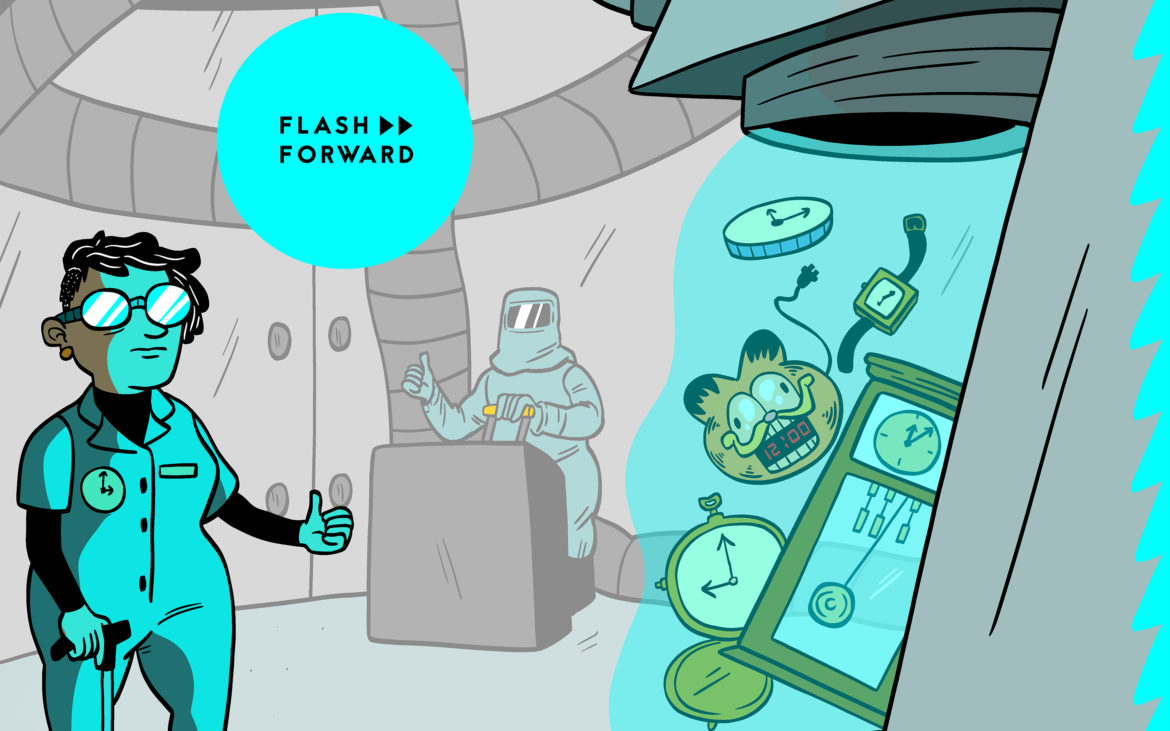
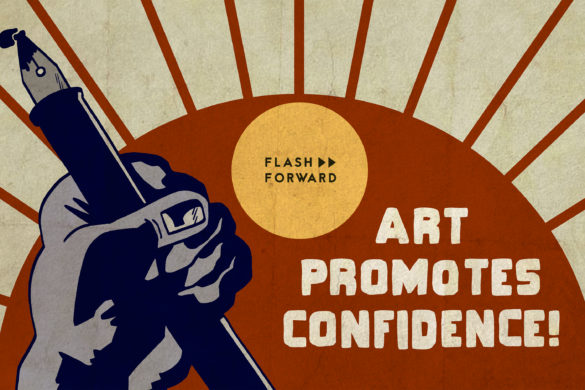
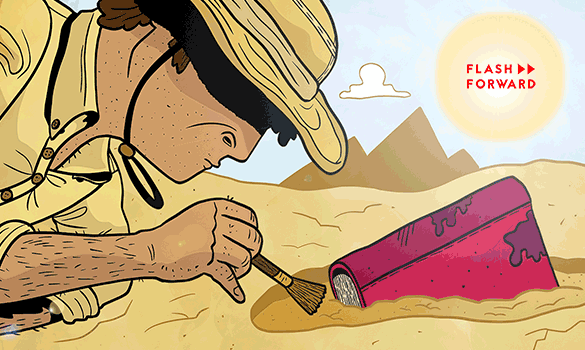
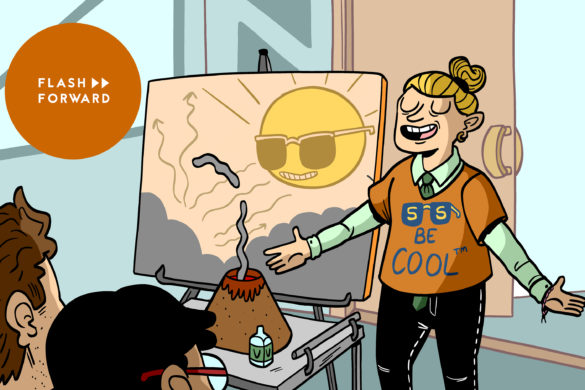
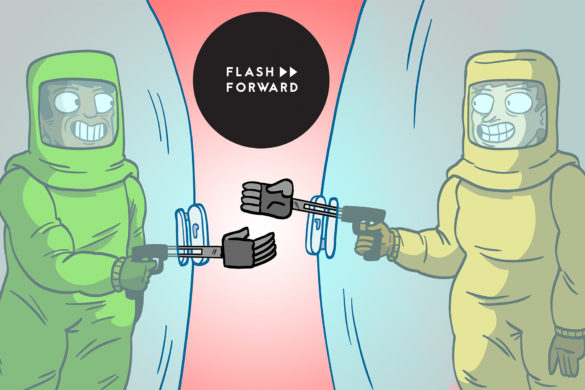
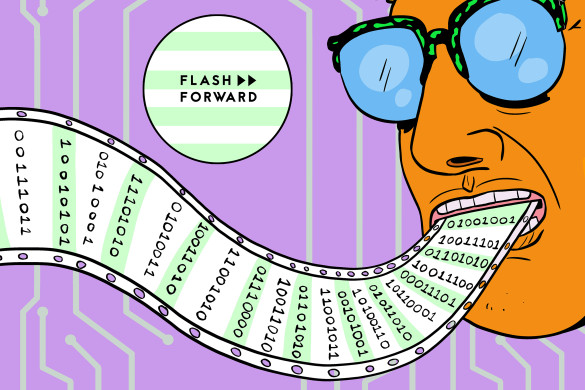
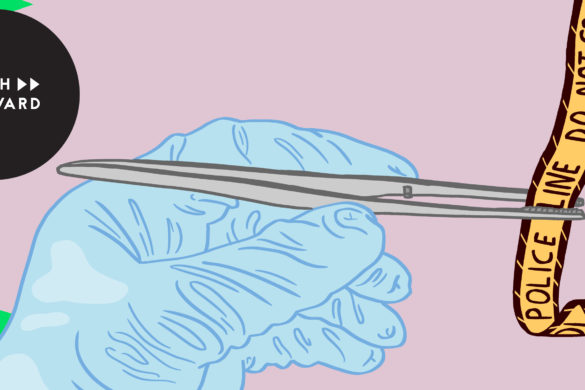

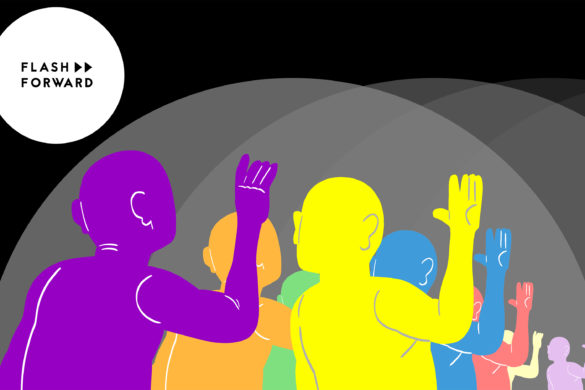

2 comments
[…] totally skipped my mind that I was listening to my podcast (Flash Forward: Time After Time) on my cellphone, a device which enabled me to communicate and interact by various means with the […]
[…] Can you and would you change history? […]